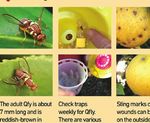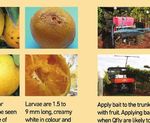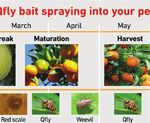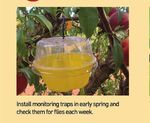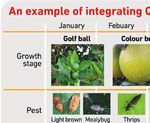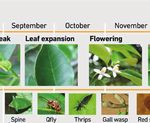Bait spraying is the most reliable and integrated pest management friendly way to reduce Queensland fruit fl y numbers in a citrus orchard ...
←
→
Page content transcription
If your browser does not render page correctly, please read the page content below
Bait spraying is the most
reliable and integrated pest
management friendly way to reduce • Not all cover sprays kill adult Qfly, or are
Queensland fruit fly numbers in a registered for use to control Qfly. Always read and
citrus orchard. follow Directions for Use on the product label.
• Even if a cover spray does kill adult Qfly that are
By suppressing the population in your orchard active at the time of spraying, it is unlikely to kill
you also help suppress numbers across the larvae in fruit and will not persist to kill the next
whole district. generation of Qfly. This is why bait spraying should be
resumed within 7-14 days after applying a
What is a bait application? cover spray.
A bait for Queensland fruit fly (Qfly) contains a food
attractant (protein) and a toxicant (insecticide). Make sure you continue the weekly Qfly bait spray
The bait mixture is applied as a low-volume spray program if the cover sprays you use in your orchard
onto tree foliage or bark. Queensland fruit flies are are not registered for control of Qfly.
attracted by the protein in the bait. Insecticide mixed
with the protein kills flies that feed on the protein. Bait applications are compatible with integrated
Using a bait, control is achieved with only a very pest management because the bait does not attract
small amount of insecticide, without applying any beneficial insects.
chemical to the fruit.
How should bait be applied?
Why apply bait, when the orchard is already Bait is applied to tree bark or foliage as a coarse
treated to control other insect pests? spot spray or as a band spray. Apply the bait to
Management of citrus pests usually focusses on trees in every second row. Do not allow the bait to
targeted sprays against scale, thrips or other pest contact fruit.
insects in spring, and possibly again in late summer,
with few cover sprays required in other months. Bait is applied in very low spray volumes, varying
between products from 6-20L/ha once mixed.
Cover sprays are not necessarily the best way to Refer to labels for directions.
control Qfly, for the following reasons:
• Queensland fruit fly is active in citrus orchards Some growers add gum to the bait mixture to help it
from colour break until after harvest, which is persist longer in the orchard. If you are adding gum,
outside the optimum windows for treatment of dissolve the gum in water for 24 hours before adding
most citrus pests. it to the bait mixture.
1When do I start bait spraying?
The date you start baiting depends on whether
you need to follow protocols for Interstate
Certification Assurance (ICA) or export markets
and whether you had Qfly last season.
If you had Qfly last season, start bait spraying
in early-mid spring to kill Qfly present in the
orchard.
If you didn’t have Qfly last season, you may not
need to bait preventively, but it is critical that
you install monitoring traps in early spring.
• Check traps weekly
• As soon as Qfly appears, begin bait
spraying and continue baiting weekly until
after harvest
Keep checking traps after each bait application.
If Qfly are still present in traps despite applying
bait, consider a cover spray.
If fruit remains on trees or the ground after
harvest and there has been Qfly activity in the
season, consider a post-harvest application.
In regions where fruit fly are established
Citrus Australia recommends routine bait
spraying commencing in Spring; traps
should be monitored to detect spikes in
populations.
Monitoring – Queensland fruit fly has become established in parts of Victoria and southern NSW.
Monitoring for presence (or absence) of Qfly is now
an essential component of your pest management
program.
Monitoring lets you know when fruit fly populations
are building up, and therefore when to start baiting.
Monitoring also shows you whether treatment has
been effective.
Many brands of traps are available. They all contain
an attractant and either a small dose of pesticide or a
liquid in which the fly drowns.
Recommendations:
• Set monitoring traps out by mid-August
• Place a trap every 400m across the orchard
• Follow label instructions about trap recharging
and replacement
• Check traps weekly for fruit fly. Check fruit for
sting marks or larval damage
• If you employ a scout, add fruit fly monitoring
to their duties
• If flies are found in traps or in fruit, start baiting
or, if necessary, apply a cover spray
(following label instructions)
2Active ingredients and trade names extracted from the Agricultural Pesticides and
Veterinary Medicines Authority (APVMA) database in May 2020.
The list includes products that were registered, or Chemical labels and the status of registration or
permitted under permit, for control of Qfly in citrus, in permits can change. Refer to label Direction for Use
NSW and Victoria, in May 2020. for application rates and restrictions on use.
1. Bait – Spot spray or band spray weekly onto foliage or bark. Avoid contact with fruit.
PURPOSE ACTIVE INGREDIENT PRODUCT NAME COMMENT
Fruition® Natflav® 500 yeast bait
A food source in Hym-Lure® Protein Bait
the bait mixture Protein Bugs for Bugs Fruit Fly Lure Yeast Autolysate Add insecticide
attracts Qfly Cera Bait® hydrolyzed protein
Chlorpyrifos Lorsban 750 WG, Pyrigran (NSW and Qld)
Maldison Fyfanon® 440, Fyfanon® 1000, Hy Mal®
An insecticide in Lepidex® 500, Dipterex® 500, Tyranex® 500 SL
the bait kills Qfly Trichlorfon Add protein
Surefire Trepidex 500, AC Tripster500 SL
that feed on the PER 14932 allows use of abamectin as attractant
protein or yeast Abamectin Vertimec Insecticide/Miticide or Vantal
Upgrade Miticide/insecticide as band sprays
Some bait Amgrow organix fruit fly control
products contain Protein + sugar + Eco-naturalure® fruit fly bait concentrate This is a pre-mix of
a food source spinosad attractant and an
and insecticide Naturalure® fruit fly bait organic insecticide
as a pre-mix
2. Cover spraying – If fruit has sting marks, or numbers of flies in traps increase, a cover spray
may be warranted. Follow the product label Directions for Use. Wet the canopy to run-off.
PURPOSE ACTIVE INGREDIENT PRODUCT NAME COMMENT
Dimethoate Dimethoate ®400, Danadim, Saboteur Labels include
Foliar cover spray
Directions for Use for
Maldison Fyfanon ®440 EW cover spraying
Dimethoate has
Foliar cover spray re-entry
for removal of restrictions
adult insects Pyrethrins PyGanic Organic Insecticide
immediately Withholding periods
prior to harvest must be sufficient
to meet export and
domestic maximum
residue limit
3. Post-harvest applications – Permit (PER13859) allows treatment of ground under the
fruiting crop, or the foliage, after harvest.
PURPOSE ACTIVE INGREDIENT PRODUCT NAME COMMENT
Apply as a foliar
Permit PER13859 applies to registered DO NOT apply more
and/or ground
Dimethoate products containing 400 g/L dimethoate as than 2 applications
cover spray to
their only active constituent after harvest
both fallen and
Re-entry periods apply
retained fruit
Disclaimer: Always read and follow the label before using any of the products mentioned. Off label use is not recommended. We do not
guarantee that this publication is without flaw of any kind or is wholly appropriate for your particular purposes, and therefore disclaim all
liability for any error, loss or other consequence which may arise from you relaying on the any information in this publication.
3This work was produced by the Greater Sunraysia Pest Free Area with funding from the Victorian Government’s Managing fruit fly regional grant program. Design & Production by Haynes Design Pty - July 2020 4
You can also read




